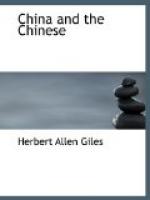It will be more interesting to turn to any sayings of Lao Tzu which we can confidently regard as genuine; and those are such as occur in the writings of some of the philosophers above-mentioned, from which they were evidently collected by a pious impostor, and, with the aid of unmistakable padding, were woven into the treatise, of which we may now take a long leave.
Lao Tzu imagined the universe to be informed by an omnipresent, omnipotent Principle, which he called Tao. Now this word Tao means primarily “a road,” “a way”; and Lao Tzu’s Principle may therefore be conveniently translated by “the Way.”
Fearing, however, some confusion from the use of this term, the philosopher was careful to explain that “the way which can be walked upon is not the eternal Way.” But he never tells us definitely what the Way is. In one place he says it cannot find expression in words; in another he says, “Those who know do not tell; those who tell do not know.”
The latter saying was used by a famous poet as a weapon of ridicule against the treatise. “If those who know,” he argued, “do not tell, how comes it that Lao Tzu put his own knowledge into a book of five thousand and more words?”
We are assured, however, by Lao Tzu that “just as without going out of doors we can know the whole world, so without looking out of window we can know the Way.”
Again we have, “Without moving, you shall know; without looking, you shall see; without doing, you shall achieve.”
Meanwhile, we are left to gather from isolated maxims some shadowy idea of what Lao Tzu meant by the Way.
It seems to have been a perpetual accommodation of self to one’s surroundings, with the minimum of effort, all progress being spontaneous and in the line of least resistance.
From this it is a mere step to doing nothing at all, the famous doctrine of Inaction, with all its paradoxes, which is really the criterion of Lao Tzu’s philosophy and will be always associated with Lao Tzu’s name.
Thus he says, “Perfect virtue does nothing, and consequently there is nothing which it does not do.”
Again, “The softest things in the world overcome the hardest; that which has no substance enters where there is no crevice.”
“Leave all things to take their natural courses, and do not interfere.”
“Only he who does nothing for his life’s sake can be truly said to value his life.”
“Govern a great nation as you would cook a small fish,”—do not overdo it. Do not try to force results. The well-known Greek injunction, “not to go beyond one’s destiny,” ouk huper moron, might well have fallen from Lao Tzu’s lips.
All this is the Way, which Lao Tzu tells us is “like the drawing of a bow,—it brings down the high and exalts the low,” reducing all things to a uniform plane.
He also says that if the Way prevails on earth, horses will be used for agricultural purposes; if the Way does not prevail, they will be used for war.




